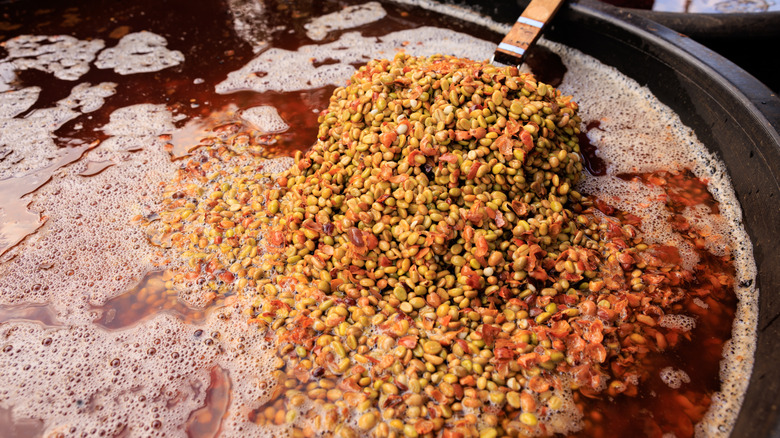The Difference Between Co-Fermented And Infused Coffee
When you think about flavored coffee, the first thing that may come to mind is a bag of hazelnut- or vanilla-infused coffee beans. There is no set standard for what "infused coffee" means, but generally, when people talk about infusing coffee, they mean adding a flavoring agent after roasting. This entails spraying a chemical or natural flavored oil onto the bean. Another way to infuse flavor is barrel-aging green beans to give them the taste of the spirit previously in the barrel. Lately, a newer way to add subtle notes has hit the specialty coffee scene — adding a natural ingredient aside from coffee to the fermentation process, or co-fermenting. This brings a more subtle taste to the coffee than other infusion methods and is used to accentuate flavor notes already found in the bean.
Fermentation in coffee isn't new, as all coffee is fermented before it's roasted. Whether the preferred method for the beans is washed, natural, anaerobic, or any of the other processes coffee producers play with, at least a little fermentation occurs. The jury is still out on whether co-fermented falls under the "infusion" category, but that's all semantics until the coffee industry hammers out a standard set of definitions. The most common addition for co-fermentation is fruit, but spices like cinnamon can be common, and some producers are even playing around with additions like flowers or hops.
Why is co-fermented becoming more popular?
Co-fermenting coffee has been practiced for a few decades by producers in Colombia, but it's only recently gaining traction in the wider specialty coffee market. A lot of the uptick is driven by roasters trying to make their mark in the industry, creating products that only they can provide. As more consumers branch out into high-quality coffee, many also look for unique flavors. The many flavors found in traditionally infused coffees are often harsh and used to mask low-quality beans. While this is a good way to sell beans that normally might not be appealing, these flavored coffees often need a lot of milk and sugar to make them palatable. The subtlety of co-fermentation allows for all the flavor without the harshness.
Some coffee connoisseurs see co-fermentation no differently from any other flavoring method, instead preferring a balanced wet-fermented or natural coffee over the so-called "flavor bombs" co-fermented coffee is sometimes seen to be. Ultimately, all that matters is how it tastes to you! If you want to try this cutting-edge technique you can find roasters such as Dak, Black & White, or Brandywine who employ it. Order a bag, follow our tips for making the best pour-over coffee at home, and find out if co-fermented coffee is for you!

